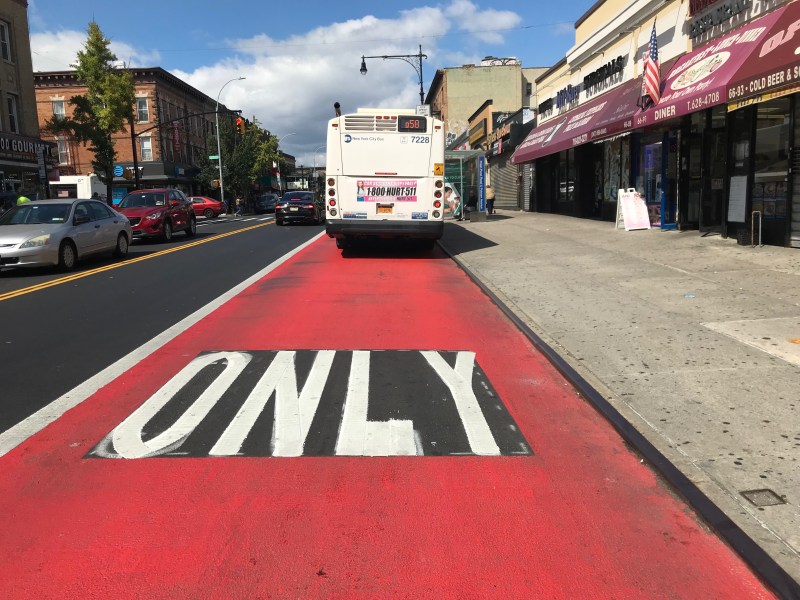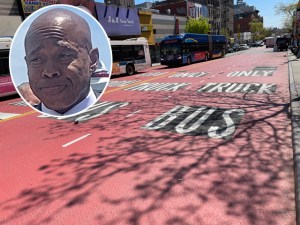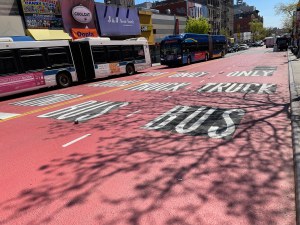FALL PREVIEW: DOT Unveils 181st Street Busway
A landmark makeover that would speed commutes in a congested corridor is set to start in November.

The congested corridor of 181st Street in Washington Heights — home of the George Washington Bridge Bus Terminal and a thriving commercial district — is set to get a landmark makeover this fall.
The proposed 181st Street Busway — which would stretch from Broadway to Amsterdam Avenue and turn a piece of the block into a bus-only street — would help 42,000 bus riders on five different bus routes on the block, who are stuck moving at an average speed of 3.7 miles per hour, according to the Department of Transportation, which presented a preliminary design on Thursday to the area’s community advisory board.
The street improvement is badly needed, according to the agency, which noted that the MTA runs 50 buses an hour on the street during peak commuting hours and that 69 percent (nice) of Washington Heights and Inwood households are carless and commute using public transportation. Bus passengers make up from 62 percent to 70 percent of road users on the street, the agency said.
As well as being the main commercial corridor in Washington Heights, 181st Street functions as a bridge between Manhattan and the Bronx: Some 5,900 bus commuters arrive daily on 181st Street from the Bronx during the morning rush hour, and 5,700 bus riders come from the Bronx to 181st Street during evening rush hours.
An independent analysis by the Tri-State Transportation Campaign shows that the bus routes that use 181st Street lead to five hospitals in the Bronx and 4,326 essential workplaces in both boroughs.
The busway is expected to start a month later than Mayor de Blasio anticipated when he announced in June that the city would install five busways “urgently.” The DOT said that a revised plan would be presented in October after the agency finished a traffic and parking analysis for the block and surrounding streets, and that the busway would go in after a final plan is shown to Community Board 12 in November.
But Inwood and Washington Heights’s City Council rep was willing to give the DOT the extra time.
“The 181st busway must take into account many varying factors unique to Northern Manhattan,” said Council Member Ydanis Rodriguez, who is chairman of the Transportation Committee. “COVID-19 has been the culprit behind numerous delays in initiatives and projects. The DOT has also undertaken many emergency projects like that on the Washington Bridge which has redirected many of their resources. I will be working closely with City Hall, DOT Commissioner Polly Trottenberg, Community Board 12, and advocates to ensure we have a plan that works for the community.”
Per the proposal:
- Eastbound car traffic would be banned between Broadway and Wadsworth Avenue, while drivers going east between Wadsworth and Amsterdam Avenue would be required to turn right at the nearest intersection from the one they entered.
- Westbound local traffic wouldn’t be banned from any part of the street, but those drivers would also need to make the first right turn off the block after they entered it.
- At the intersection of 181st and Amsterdam Avenue, drivers going east would no longer be permitted to make left turns from 181st on to Amsterdam.
The DOT also said that it was still determining the busway’s hours of operation.

If the 181st Street plan succeeds without a hitch, it would be unusual. Of the five busways that the mayor announced, all have been mired in delays and local opposition but Downtown Brooklyn’s Jay Street Busway. City Council Member Peter Koo derailed a busway planned for Main Street in Flushing by leading a protest at which he shouted “BLM stands for ‘Business Lives Matter.'” Lawmakers in Jamaica, meanwhile, told the DOT that they want to see a planned busway for Jamaica Avenue moved to Archer Avenue. In Manhattan, the owners of luxury businesses like Armani and Tiffany and Co. succeeded in getting the DOT to drop its plan to add a bus lane to Fifth Avenue, although the agency is still touting the larger “complete streets” aspects of the project, such as a protected bike lane and more pedestrian space.
Even a slightly delayed busway would be a historical victory for bus riders on 181st Street, a block that the city has been trying to improve for over a decade. The Bloomberg DOT suggested that 181st could be turned into a complete street back in 2008, and even presented CB12 and elected officials with a proto-busway design in 2010 that would have put eastbound and westbound bus-only lanes on the south side of 181st Street from Amsterdam to Broadway.



